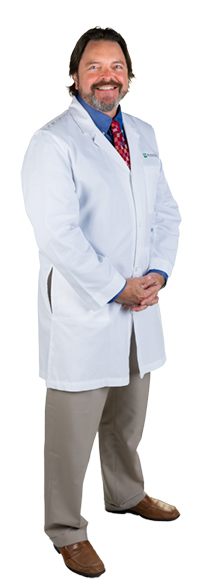Staff Neurologist, Riverside Neurology Specialists
 Thirty years ago, Dr. John Livingstone picked a specialty based on a hopeful bet. Major advances in neurology during his lifetime, he felt, would transform care for patients who had little to no hope of recovery.
Thirty years ago, Dr. John Livingstone picked a specialty based on a hopeful bet. Major advances in neurology during his lifetime, he felt, would transform care for patients who had little to no hope of recovery.
Today, even Dr. Livingstone has been amazed at how right he was.
The longtime neurologist and researcher with Riverside Health System has watched treatment options for devastating progressive diseases rapidly multiply. As medical director of Riverside’s Stroke Program for more than a decade, he also has seen the crucial time window for helping stroke patients continue to expand.
“There’s been a total paradigm shift in care in so many areas,” Dr. Livingstone says. “We’re seeing turnarounds in patients that we never would have dreamed of before. As a doctor, it’s just immensely satisfying to be able to offer so many more options.”
Perhaps nothing has undergone such dramatic changes as stroke care, which along with movement disorders is a particular area of interest for Dr. Livingstone. He is the physician leader of the dynamic stroke team at Riverside Regional Medical Center, a comprehensive stroke center that has quickly incorporated standard-of-care updates for administration of the two most effective therapies, tissue plasminogen activator (tPA) and thrombectomy.
The timeframe in which tPA can dissolve blood clots after a stroke, already up from the originally-approved three hours to 4½ hours, is soon expected to increase to up to nine hours after an expedited expert review of new research data.
A thrombectomy for a large vessel occlusion, meanwhile, now can be done up to 24 hours after a stroke, as compared just six to eight hours not long ago. Dr. Livingstone helped the stroke team that led the way in enacting this critical change at Riverside during the past two years.
Currently, Riverside is an integral part of a regional team of emergency providers that has created an EMS algorithm on which patients would benefit from early transfer to a comprehensive stroke center, thus potentially bypassing a primary stroke center to expedite care. Ultimately, Dr. Livingstone hopes those guidelines would be adopted statewide.
“I’m proud to be part of an amazing team that is at the forefront of acute stroke treatment, which truly is changing every year,” he says. “We have some patients coming in paralyzed on one side, unable to speak, seemingly destined for a nursing home environment, yet they walk out of the hospital. It’s unbelievable.”
For patients with multiple sclerosis, epilepsy, Parkinson’s disease and Alzheimer’s disease, Dr. Livingstone also has choices he never did before, thanks in part to clinical research done by him and fellow Riverside physicians.
This year, Dr. Livingstone is enrolling patients in two trials on long-term treatments for Secondary Progressive and Relapsing Remitting MS, the latest in a series of MS trials at Riverside. Both are double-blinded, randomized studies on potential oral medications.
For his patients with epilepsy, Dr. Livingstone has access to dozens of medications, more effective surgeries and implanted devices such as the vagus nerve stimulator, designed to prevent seizures. While Alzheimer’s and Parkinson’s remain incurable, symptom control has vastly improved in the last two decades.
“When I was in medical school, there were no treatments for Alzheimer’s or MS,” Dr. Livingstone recalls. “Nothing new had come out for Parkinson’s in 16 years, and there had been one new anti-epileptic drug in 20 years. Now we’ve got 28 approved medications for epilepsy, 16 for MS, four for Alzheimer’s, and seven to 10 new Parkinson’s drugs – and counting.”
A Georgia native, Dr. Livingstone graduated with a biology degree from King College in Bristol, Tenn. At Medical College of Georgia, he considered going into pediatrics until summer research work with a pediatric neurologist put him on a new path.
Dr. Livingstone completed a residency in Neurology at the Mayo Clinic. Board certified by the American Board of Psychiatry and Neurology, he has worked at Riverside Neurology Specialists – formerly known as Hampton Roads Neurology – since 1994.
A member of the American Academy of Neurology and Past President of the Virginia Neurologic Society, he has served on multiple leadership teams at Riverside, including the Medical Ethics, Pharmacy & Therapeutics and QPC committees.
Inevitably, Dr. Livingstone still must care for patients with incurable illnesses, including the always-fatal amyotrophic lateral sclerosis. His philosophy, however, is that an important part of his job is to keep people from losing hope.
“Though certain diseases may be untreatable, every patient is treatable,” he explains. “I don’t ever want anyone to feel a sense of abandonment. I am there to help refocus them on positives and to give them the best quality of life for as long as I can, even if all I really can do is sit and talk to them.” Not surprisingly, patients rate Dr. Livingstone an average of 4.9 on a 5-point scale on independent patient satisfaction research surveys.
Outside work, Dr. Livingstone is a married father of four with his first grandchild due in December. In addition to spending time with his family, he enjoys outdoor cooking on his combination smoker-grill.
Along with continued improvements in stroke care, Dr. Livingstone believes the next frontier in neurology will be true treatments for neurodegenerative disorders.
“There’s so much research into these diseases that are huge long-term burdens for families and our entire country,” he notes. “It’s still a time of exciting discoveries, just like when I started out, which is why I chose neurology. We still have a long way to go – but we’ll get there.”
Keep in mind, he was very right before.

